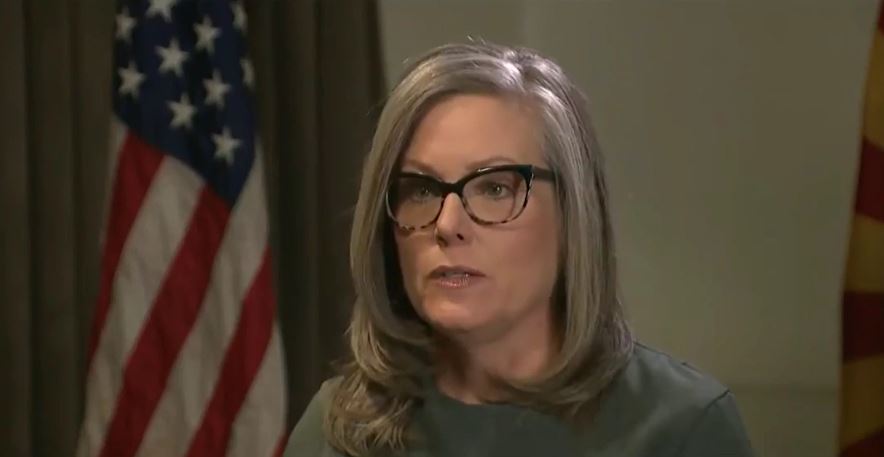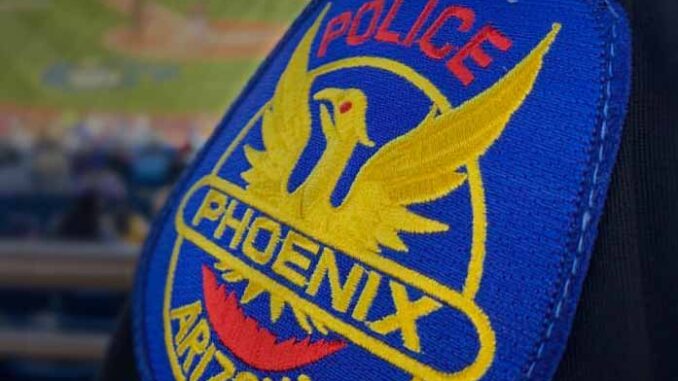
by Jonathan Eberle | Jul 14, 2025 | News
By Jonathan Eberle |
The Arizona Department of Public Safety (AZDPS) has announced the launch of a new statewide alert system aimed at helping law enforcement and the public quickly locate missing and endangered individuals under the age of 65. Known as the Turquoise Alert, the initiative officially went into effect on Thursday, July 10.
Created through House Bill 2281 and signed into law by Governor Katie Hobbs on May 13, the alert system is formally named “Emily’s Law” in honor of Emily Pike, a member of the San Carlos Apache Tribe whose case helped spotlight the need for broader missing persons tools, particularly for Indigenous communities.
“The Turquoise Alert represents a vital step forward in protecting vulnerable individuals in our communities,” said AZDPS Director Colonel Jeffrey Glover. “By empowering the public with timely, actionable information, we can make a critical difference in locating those who are missing and bringing them home safely.”
The alert is designed for cases involving individuals under the age of 65 who have gone missing under suspicious or unexplained circumstances and are believed to be in danger. To trigger a Turquoise Alert, the following criteria must be met: the missing person is under 65 years old; local law enforcement has exhausted all available resources in the search; there is credible concern that the person is in danger or with a potentially dangerous individual; and authorities possess enough descriptive information to assist in the recovery effort.
Once activated, alerts will be broadcast across multiple platforms: Emergency Alert System (EAS); Wireless Emergency Alerts (WEA) to cell phone; Highway signs via the Arizona Department of Transportation (ADOT); Social media accounts of the requesting law enforcement agency; the AZDPS Alerts website; and an All-Points Bulletin (APB) sent to law enforcement statewide.
Based on data from similar programs, AZDPS anticipates issuing 15 to 30 Turquoise Alerts per year, though that number could increase with expanded public awareness.
The new system adds to Arizona’s existing suite of public alerts, including the Amber Alert, for abducted children; Silver Alert, for missing seniors or those with cognitive impairments; and Blue Alert, for threats to law enforcement.
By establishing a dedicated framework for endangered adults under 65—many of whom previously fell outside the scope of other alert systems—state officials say the Turquoise Alert helps fill a critical public safety gap.
Jonathan Eberle is a reporter for AZ Free News. You can send him news tips using this link.

by Matthew Holloway | Jul 13, 2025 | News
By Matthew Holloway |
Arizona’s Democrat Governor Katie Hobbs is facing a new round of severe criticism and wide condemnation. On July 9th, reports surfaced that Hobbs nominated her Democrat ally and failed District 17 legislative candidate Dana Allmond for a role in the Department of Veterans’ Services. Hobbs then pulled back the nomination and appointed Allmond to a newly created post with a $170,000 annual salary and a $114,000 annual contract for her assistant, Marcus Trombetta.
Arizona Senator Jake Hoffman (R-LD15) released a scathing statement posted to X on Wednesday writing, “Katie Hobbs nominated fellow Dem politician, Dana Allmond, for a cushy gov’t job. Then Katie DEMOTED her. Then Katie invented a job that’s never existed before for her. Then Katie paid her & her asst. nearly $600,000 of YOUR money!
“FULL STATEMENT: Katie Hobbs’ jaw-dropping nearly $600,000 handout of taxpayer money to a former Democrat politician and her assistant for newly invented jobs reeks of corruption.
“It’s sickening that Hobbs continues to treat Arizona’s government like her personal friends-and-family slush fund, doling out lavish six-figure salaries to political cronies.
“With Hobbs it’s clear, when she’s not entangled in pay-to-play schemes, she’s plundering Arizonans’ hard-earned dollars as if they’re her own personal piggy bank.”
Hoffman’s statement aligns well with reporting from the Arizona Capitol Times, which was confirmed by the Department of Economic Security. Per the Times, after her replacement as nominee for head of the Department of Veterans’ Services with John F. Scott II in April, Hobbs reportedly created the role of “senior executive consultant” for Allmond and promptly renewed her state contract.
Hobbs’ press aide Christian Slater told the outlet that Allmond is part of the DES “senior engagement team” in her new role and will be tasked with helping Arizona veterans access DES services. The move follows a 5% reduction in force at the Department of Economic Security, owing to the Governor’s failure to adjust the budget for reduced federal grants.
According to the Times, the terminated staffers at DES received their 2 ½ weeks’ notice just days after Allmond’s new contract became effective.
In a statement, Slater dismissed any connection and attempted to shift blame to the federal budget cuts driven by the Trump administration, ignoring that Hobbs and Democrat legislators had ample opportunity to work with GOP leaders to account for the difference.
“The workforce reduction at DES was an unfortunate consequence of the Trump administration’s reckless cuts that endanger DES’s work to combat fraud and efficiently deliver the critical services Arizonans rely on,” Slater claimed.
As previously reported by AZ Free News, Republican legislative leaders have questioned the apparent duplication of duties between the new DES “senior executive consultant,” and the Department of Veterans’ Services existing responsibilities.
Earlier in the year, Sen. Hoffman challenged DES Director Michael Wisehart before the Committee on Director Nominations. Per the Times, Wisehart didn’t refute that the role duplicates the responsibilities but answered that Allmond would help connect veterans with needed services, noting that DES also has programs that work with veterans.
A blistering article issued by the Arizona Free Enterprise Club, dating back to March 2024, has also shown that the new role for Allmond is only the most recent in a series of controversial new jobs created by Governor Hobbs. According to the article, at that time, Hobbs had created forty new roles including: six people working in the Office of Resiliency, four new employees in the Office of Tribal Relations, and three new in-house attorneys.
Matthew Holloway is a senior reporter for AZ Free News. Follow him on X for his latest stories, or email tips to Matthew@azfreenews.com.

by Matthew Holloway | Jul 13, 2025 | News
By Matthew Holloway |
In a social media post that has garnered wide speculation, Arizona Democrat Senator Ruben Gallego announced that he’s headed for Iowa to hold a Quad Cities Townhall meeting and is expected to appear at the State Fair in Des Moines as part of a two-day tour on August 8th and 9th. Gallego’s staff told the Des Moines Register that the Senator intends to discuss the One Big Beautiful Bill Act, which he refers to as the “disastrous budget bill.”
Given that his visit follows one from 2028 Democrat Presidential hopeful and former U.S. Transportation Secretary Pete Buttigieg in May, it appears likely that Gallego is testing the waters in the 2028 shadow primary that is unfolding in Iowa.
The Arizona Republic’s Laurie Roberts seemed to share the assessment that Gallego is eyeing the presidency in an op-ed published on Thursday in which she cited a video released by Gallego in which crowds are chanting for him set to Queen’s “We Will Rock You.” Roberts wrote that on August 8th, Gallego “will make the ritual trip of any politician who dreams of becoming president — to the Iowa State Fair to gobble down corn dogs and gobble up some attention.” She quipped that the 45-year-old first-term Senator “thinks Iowa can make him a star… He’s not. Not yet anyway. But he’s clearly hoping to become one.”
Commentary on his post to X alternated between condemnation for “already eyeing his next job,” to critics asking, “Do you ever do your job for your own damn state?”
Gallego’s chief of staff, Raphael Chavez-Fernandez, told the Register in a statement, “Like most Iowans, Ruben Gallego didn’t grow up having things handed to him — he had to work hard and pay his dues. That’s why he’s headed to the Hawkeye State to call out those who backed Trump’s billionaire tax scam at the expense of Iowa’s good, hard-working people. Ruben’s not afraid to say the quiet part out loud: that Iowa families are getting screwed, and Iowans deserve leaders who will fight for them every single day.”
Turning Point Action’s Jeanette Garcia called the move, “Embarrassing.”
Gallego’s 2024 Republican opponent for Senate, Kari Lake, weighed in writing, “This guy has only been in the Senate for about 15 minutes, and he’s already looking for his next position. I love the people of Iowa. I love the people of Arizona. And they both deserve better than Ruben Gallego.”
Former AZGOP Exec, Member-at-Large Christian Lamar responded quipping, “Ruben Gallego is the blueprint for another useless politician, who squats in office and moves up to another higher office. Gallego actually believes he’s more popular than Kamala Harris.”
Emerson College polling released in June seemed to disagree though, determining that former U.S. Secretary of Transportation Pete Buttigieg stands to be the leading contender in a potential 2028 DNC Primary followed by Former Vice President Kamala Harris and California Gov. Gavin Newsom. Gallego didn’t appear among the 15 potential candidates.
In May, prior to speaking to voters in Pennsylvania at a similar speaking event, Gallego seemed to demure from talk of a 2028 Presidential Run in comments to NBC News when he called the question of a presidential run “a land mine,” adding, “Has it ever crossed my mind? F—ing of course, I’m an elected official, it crosses my mind. Am I thinking about it right now? Absolutely not.”
However, Gallego boasted, “Big donors, big organizations, well-known political big Democratic operatives that have encouraged me to run. I’m not denying that.”
Matthew Holloway is a senior reporter for AZ Free News. Follow him on X for his latest stories, or email tips to Matthew@azfreenews.com.

by Jonathan Eberle | Jul 13, 2025 | News
By Jonathan Eberle |
In response to a surge of troubling reports involving fraudulent Medicaid claims and abuse within Arizona’s healthcare system, the Senate Health & Human Services Committee has announced a special hearing scheduled for August 18, 2025, at 2 p.m. at the Arizona State Senate.
Committee Chairwoman Carine Werner (R-LD4) will lead the hearing, which aims to investigate widespread concerns tied to Arizona’s Medicaid agency, the Arizona Health Care Cost Containment System (AHCCCS). Reports point to systemic fraud involving Residential Treatment Facilities, often known as “sober living homes,” where patients were allegedly exploited in elaborate schemes prioritizing profit over care.
One of the most notable cases involves Farukh Jara Ali, the Pakistan-based owner of ProMD, who was recently indicted for submitting over $650 million in fraudulent Medicaid claims. According to investigators, some facilities bribed individuals to attend certain programs, then billed Medicaid for services that were medically unnecessary—or never provided at all.
Chairwoman Werner emphasized the urgency of addressing the issue: “We are hearing of too many instances where Arizona’s Medicaid system is being hijacked by criminals, while honest providers, patients, and ultimately all taxpayers, pay the price.”
Werner pointed out that Arizona is not alone. The state was among several affected in a recent nationwide healthcare fraud “takedown” that led to charges against more than 300 individuals. The total cost to Arizona: more than $650 million.
The upcoming hearing will bring together key stakeholders to examine what led to these breakdowns and explore policy reforms to strengthen oversight and accountability within AHCCCS. Lawmakers hope the session will also generate bipartisan momentum to protect the integrity of healthcare services and better safeguard Arizona’s most vulnerable populations.
“This isn’t just about money,” Werner said. “It’s about ensuring our healthcare system isn’t exploited at the expense of people who truly need help.”
The August 18 hearing is open to the public.
Jonathan Eberle is a reporter for AZ Free News. You can send him news tips using this link.

by Matthew Holloway | Jul 12, 2025 | News
By Matthew Holloway |
Matt Giordano, Executive Director of the Arizona Peace Officer Standards and Training Board (AZPOST) and a former Phoenix Police Commander with 20 years on the force, has been named as Phoenix’s next Chief of Police by City Manager Jeff Barton.
Giordano was selected through a lengthy process that produced three top contenders who met at a public forum in June. He was selected over Chief Malik Aziz of the Prince George’s County Police Department in Maryland, and Mirtha Ramos, the former chief of the DeKalb County Police Department in Georgia. Giordano will be the first permanent police chief in Phoenix since 2022.
Giordano’s selection may give pause to residents who support the Trump administration’s mass deportation efforts however, given that he stated the Phoenix Police wouldn’t play a role in enforcing immigration law under them, aligning with the city’s Democratic leaders.
“We have no role in immigration in a local law enforcement perspective,” Giordano told the forum. He cited a recent Phoenix Police press briefing saying, “Phoenix just put out there… they put out a press briefing last week just reminding the community, that we don’t do immigration enforcement. We will not ask about anyone’s legal status.”
In his comments, Giordano blasted SB 1070, the “Support Our Law Enforcement and Safe Neighborhoods Act” of 2010, a defining illegal immigration enforcement bill from the AZ GOP at the time. He said that he “saw the fear and distrust it created in the neighborhood, and it was it was upsetting.”
Giordano complained, “We have spent so many years now after SB 1070 trying to build back those relationships. We’re not there yet. There’s still a lot of work to be done. There’s still a lot of distrust in the community, but I think we’re going in the right direction.”
But then, seeming to refer to the mass deportations undertaken by the Trump administration, he added, “Now it almost seems like we’re going backwards, and it saddens me. And I don’t want to go down that road.”
He continued, “In my current role I have cultivated a relationship with every police chief pretty much every chief or sheriff in the state. We have these discussions and we’re all on the same page now: We talk to our federal partners; we get an idea of sometimes what they’re doing. But they understand that we will not cross that line and engage in immigration enforcement with them because it’s not in anyone’s best interest. It’s not outside of our purview. So that’s what my belief is: for the Phoenix Police Department moving forward to not be involved in any matter.”
Barton said in a statement that the selection of Giordano “reflects what we heard from residents, officers, and community stakeholders. Matt Giordano is a respected leader with deep knowledge of policing in Phoenix, and he has earned a reputation for integrity, accountability, and building trust.”
Phoenix’s Democrat Mayor Kate Gallego also expressed her pleasure at the Chief’s selection in a press release, “I am pleased to welcome back Matthew Giordano to the Phoenix Police Department as our new Police Chief. Chief Giordano has a deep understanding of law enforcement and Phoenix as well as the skills and experience to lead our great department. I look forward to working with him to keep our city safe and continue the reforms instituted by the City Council. I also want to thank Acting Police Chief Dennis Orender, who did an excellent job over the last few months, for his continued service to our city and the department.”
In an interview with Outspoken KTAR hosts Bruce St. James and Larry Gaydos, Republican Phoenix City Councilman Kevin Robinson, a 36-year police veteran, said that Giordano brings a “wide range of experience” and is “exactly what the department needs” to move forward. Robinson went on to highlight Giordano’s insider knowledge combined with an outsider’s perspective as key strengths for rebuilding trust and tackling issues like officer morale within the department.
Phoenix Law Enforcement Association (PLEA) President Darrell Kriplean told KTAR host Mike Broomhead that Giordano was the right choice for several reasons. He explained, “Matt has the institutional knowledge of this department having served here for so long, but he’s been gone long enough that he can come in with a fresh perspective and look at all the factors that went into the DOJ report, the things that have been debunked, … our continuous improvement measures and how we are going to continue to improve as an agency,”
In a statement following his selection Giordano said, “I’m honored to return to the department where my career began. I look forward to working alongside the dedicated men and women of the Phoenix Police Department and deepening partnerships with the communities we serve. Together, we will build a safer, stronger, and more unified Phoenix.”
Matthew Holloway is a senior reporter for AZ Free News. Follow him on X for his latest stories, or email tips to Matthew@azfreenews.com.

by Jonathan Eberle | Jul 12, 2025 | Economy, News
By Jonathan Eberle |
A new report from the Common Sense Institute (CSI) signals that Arizona’s housing market may be headed for deeper trouble, even as homebuyers enjoy a short-term dip in prices. The think tank’s second-quarter analysis shows that slowing permitting activity is threatening to exacerbate the state’s chronic housing shortage.
In Greater Phoenix, average home prices declined by 1.0% in the first quarter of 2025 and are now down nearly 7% from their July 2022 peak. However, experts warn the modest drop masks deeper affordability challenges. The average Arizona home is still more than 50% more expensive than it was in 2019, and monthly mortgage payments have more than doubled during that time.
“We’re seeing some surface-level relief in pricing, but the fundamentals of the market still point to serious long-term issues,” said Zachary Milne, Senior Economist and Research Analyst at CSI. “Without an increase in new housing supply, prices are likely to rebound—and affordability will remain out of reach for many.”
While the current increase in for-sale inventory is helping to cool the market slightly, CSI analysts caution that these effects may be fleeting. Without local reforms to streamline permitting or reduce regulatory burdens, housing supply will continue to lag demand—keeping pressure on prices and limiting options for would-be homeowners.
“The bottom line is that Arizona is not building fast enough to keep up,” Milne added. “Unless that changes, the state’s affordability problem will only get worse.”
As policymakers and local leaders grapple with how to address Arizona’s housing needs, the latest data underscores a growing consensus: the state’s structural housing shortage is not going away anytime soon—and relief for buyers may prove temporary.
Jonathan Eberle is a reporter for AZ Free News. You can send him news tips using this link.






